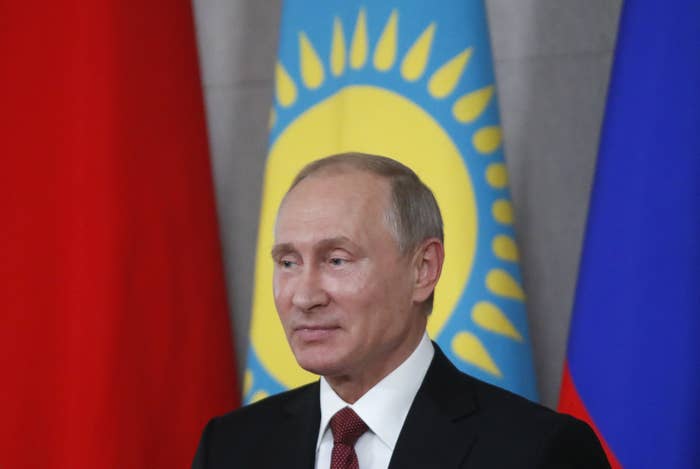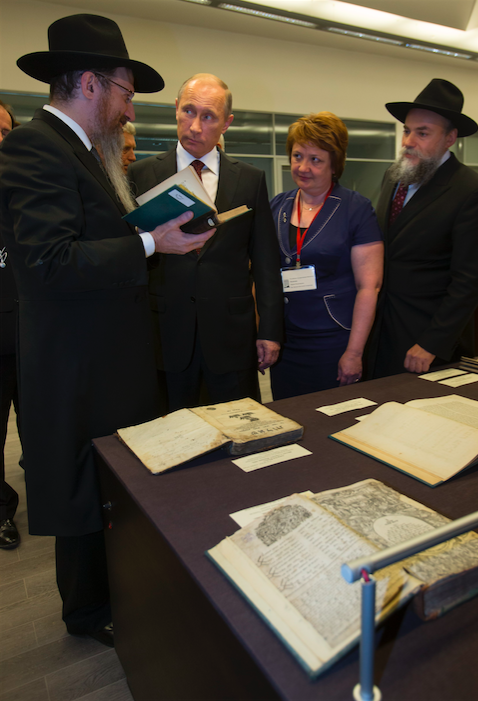
The Russian government has racked up more than $82 million in US court-ordered sanctions — a penalty that Russian President Vladimir Putin has signaled he has no intention of paying — in a case that could complicate the Trump administration’s already fraught relationship with the Kremlin.
A US judge in 2013 ordered the Russian government to pay $50,000 for each day that it defied his order to return thousands of Jewish religious texts seized in the early 20th century to a Jewish organization. The goal of the sanction, the judge wrote at the time, was to “coerce compliance.”
It didn’t work. Russia hasn’t returned the collection and now owes an estimated $82.3 million in sanctions, according to a lawyer suing over the texts. There is no sign that Russia plans to pay — the Russian government this year continued to dig in on its claims to the collection, according to letters obtained by BuzzFeed News.
Russia’s defiance of a US court could pose diplomatic and legal challenges for the Trump administration, much as it did for the Obama administration during key proceedings in the case between 2009 and 2015. The case has been largely dormant for two years, but an attorney for the group seeking the return of the collection has signaled it may move to try to claim Russian assets to satisfy the sanctions and place new pressure on Russia to hand over the collection.
The judge in the case ruled that the collection belongs to Chabad-Lubavitch, a movement within Judaism that dates to the 18th century. Some of the collection — which includes books, manuscripts, and handwritten documents — was taken by the Russian government in the 1920s, according to court papers. Other parts fell into the possession of the Nazis during World War II and were seized by the Soviet army as war booty.
Although the US government has long supported Chabad’s claim to the collection, the Obama administration opposed the 2013 sanctions order as well as Chabad’s efforts to find Russian assets in an attempt to enforce that order. In February 2016, the US Department of Justice filed papers warning that if Chabad tried to seize Russian property, “it could cause significant harm to the foreign policy interests of the United States.”
There’s been little action in court since then. One of Chabad’s lead attorneys, Steven Lieberman, told BuzzFeed News that the group has been tracking down Russian assets in the years since the sanctions order, and issued subpoenas to US financial institutions.
“We’ve received information from several of those entities that they have significant Russian Federation assets and we’re pursuing that,” Lieberman said. He declined to provide specifics about what Chabad’s lawyers had found, and when they might go back to court to ask for the judge’s approval to seize that property.
The Trump administration, already in a precarious position in its relationship with Russia, would be put in even more of a bind if Chabad does decide to go to court to try to claim Russian assets. US–Russia relations are fraught over Russian interference in the 2016 election, and President Donald Trump has had to deal with a wave of investigations and news stories about his campaign’s possible involvement.
The Russian government has lashed out before in response to rulings in the Chabad case. After a judge ordered the collection’s return in 2010, Russia froze art loans to the United States; Chabad’s lawyers have said in court filings they wouldn’t go after cultural objects that are protected under US law. A Russian court in 2014 ordered the United States to return seven books that were loaned from the collection to the Library of Congress, imposing its own $50,000 daily sanction, according to reports from Russian news outlets.
Earlier this year, Politico reported about ties between Chabad, Putin, and Trump. But as that story noted, the Chabad rabbis in the United States involved in the court fight over the collection have been at odds with a chief rabbi in Russia, Rabbi Berel Lazar, who has spoken out against the lawsuit.

The US government continues to support Chabad’s claim to the collection and to encourage Russia and Chabad “to attempt to resolve this matter to the benefit of both parties,” State Department spokeswoman Julia Mason told BuzzFeed News in an email.
“We have also offered diplomatic channels to help facilitate a solution, and at an appropriate time will continue to work towards an amicable resolution to their dispute,” Mason wrote.
Letters obtained by BuzzFeed News show that the US Senate unsuccessfully petitioned Putin on Chabad’s behalf earlier this year. In February, all 100 senators signed a letter to Putin asking him to return the collection — known as the Schneerson collection, after a prominent Chabad leader — and to honor a promise made by former Russian President Boris Yeltsin.
“We hereby respectfully request your assistance in seeing the return of the entire collection,” the senators wrote.
Putin was unmoved. In April, then–Russian ambassador Sergey Kislyak responded in a letter to Senate Minority Leader Chuck Schumer, calling Chabad’s pursuit of the collection “senseless” and its claim to the collection “groundless.”
“The collection is part of the cultural heritage of the multinational and multiconfessional people of Russia, including those who practice Judaism,” Kislyak wrote. “The Schneerson Library belongs to the Russian State Library funds, which form an inalienable state property.”
A spokesperson for the Russian embassy in Washington did not return a request for comment.
Rabbi Yossi Cunin, a leader within the Chabad movement who has been overseeing the legal fight, said in an interview that Chabad was prepared to pursue the case indefinitely. The organization’s lawyers are handling the case pro bono, although Cunin, who is based in Beverly Hills, California, said they have incurred some legal expenses, as well as the costs of traveling to Russia and Washington, DC, to meet with officials and pursue the case.
“Without these books, there would be nothing for the rebbes to teach or to inspire people with. These books represent who they are, their lives,” Cunin said. “This is a historical injustice. It’ll take as long as it takes until every last book is returned.”
Nicholas O’Donnell, a lawyer in Boston who has been following the Chabad case and represents individuals suing foreign governments for the return of Nazi-looted art and artifacts, said that even though US law allows lawsuits against other countries in certain circumstances, it’s much stricter in terms of how winning parties can enforce judgments. If the sanctions order in the Chabad case ends up being toothless, he said, it could affect how other countries respond to future US court orders.
“Russia is an extreme example of a foreign sovereign that is simply saying, ‘We’re not going to play at all.’ But there’s a lot of other cases going on against other foreign sovereigns … and those governments are going to have a road map for how to stonewall even if they lose,” O’Donnell said.
The Library and the Archive

The religious texts at issue are divided into two categories: the “Library,” a trove of more than 12,000 books and manuscripts, and the “Archive,” a set of approximately 25,000 pages of handwritten texts. According to court documents, much of the “Library” was seized by the Russian government — then known as the USSR — around 1917 during a period of civil unrest.
A prominent Chabad leader, Rabbi Joseph Isaac Schneersohn, separately kept the Archive. At the start of World War II, he was living in Poland. As the Nazis invaded Poland, he escaped to Latvia and eventually came to the United States in 1940, but he wasn’t able to take the texts with him. The Nazis seized the Archive when they invaded Poland, and it was then claimed as war booty by the Soviet Red Army.
In 2004, Chabad, which is incorporated as a nonprofit with headquarters in New York but has offices around the world, sued the Russian government in federal court in California, claiming violations of international law. Russia participated in the case at first, hiring lawyers and arguing the US court lacked jurisdiction to hear the case.
In July 2005, the judge in California transferred the case to the US District Court for the District of Columbia, finding that it was the more appropriate venue. In December 2006, US District Judge Royce Lamberth denied Russia’s request to dismiss the case. Russia unsuccessfully appealed and then withdrew from the case altogether in 2009, insisting the US court lacked authority over property in Russia. In 2010, Lamberth entered a judgment in favor of Chabad and ordered Russia to surrender the collection.
In 2013, Lamberth granted Chabad’s request for civil contempt sanctions against Russia, rejecting arguments by the US government that it could hurt diplomatic efforts to reach a resolution — the judge noted Russia had long resisted such overtures — and that it could undermine the United States’ interests in avoiding similar orders from foreign courts. Two years later, the judge approved an interim judgment of $43.7 million in sanctions, which gave Chabad more leeway to pursue Russian assets.
Lamberth, who has sat on the DC federal court bench since 1987, takes pride in his rulings in the case. At a court hearing in September in an unrelated case about a breach of contract lawsuit against the Iraqi government, the judge referred back to the Chabad case as proof that he had no qualms about penalizing a foreign government for refusing to follow his orders. He said that Putin had once called him a “cowboy judge.”
“That is one of the highlights of my life,” the judge, a Texas native, said.

